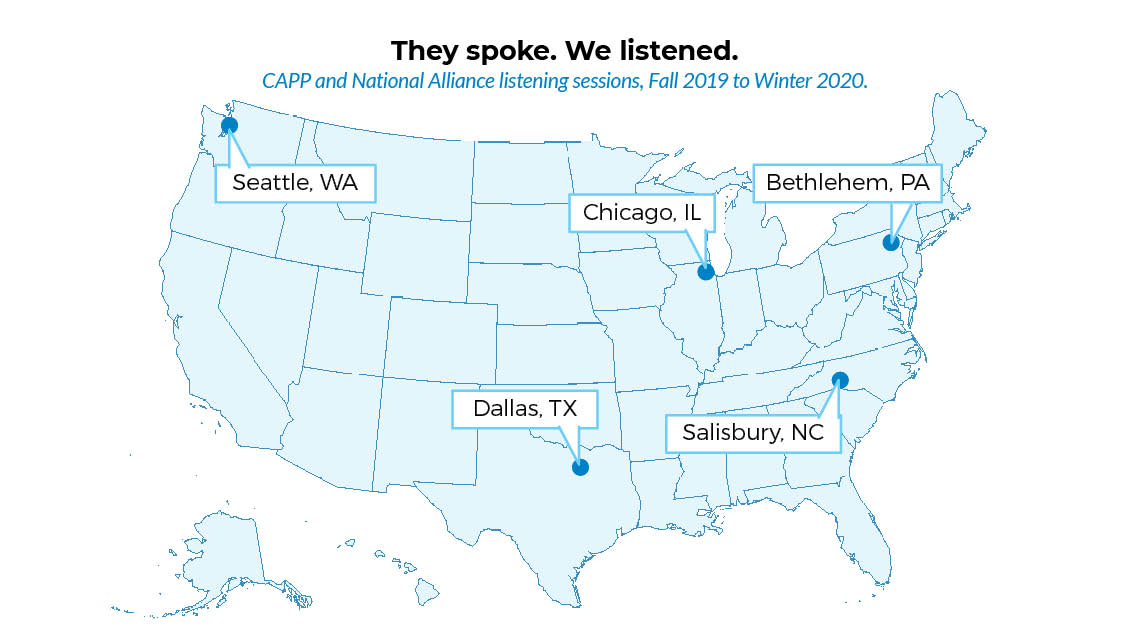Research 2020
Employer-Physician Collaborations to Deliver Quality Care

As part of a larger effort to foster direct communication between employers and health care providers, the Council of Accountable Physician Practices (CAPP) conducted a series of listening sessions with health care purchasers across the country between August 16, 2019 and January 24, 2020. The purpose of the research was to understand the context in which employers make health care purchasing decisions, what they want for their employees in terms of health care delivery, and the barriers that undermine a direct, collaborative relationship between the buyers and providers of care.
Recruitment was conducted by local coalitions of the National Alliance of Healthcare Purchaser Coalitions including Dallas-Fort Worth Business Group on Health, Lehigh Valley Business Coalition on Health, Midwest Business Group on Health, North Carolina Business Group on Health, and Washington State Alliance. The listening session participants represented small, medium, and large employers ranging in size from 200 to more than 250,000 employees and included private and public employers as well as large labor trusts. Nearly all participating employers were self-insured, sharing financial risk for providing healthcare benefits. Between eight and ten participants attended each discussion, representing a total of 47 employers.
What employer-purchasers want from health care
- Affordable coverage
- Simple, transparent financial transactions
- The right care, not more care
- A seamless and coordinated patient experience
- Increased and timely access to specialists
- Integrated behavioral health
Why employers struggle with evaluating health care providers
- Limited discretion to design networks
- Lack resources and reliable tools to evaluate and compare provider quality
- Can’t see what’s working, only what’s not
- Distrust of health plans, consultants, and providers
High-priority areas for physician-employer collaboration
- Focusing on achieving a coordinated care experience for patients so that an illness is not economically and emotionally devastating, and medical outcomes are optimized
- Advocating for transparency on price and quality measures
- Building models of care that integrate behavioral health with medical care
Employers’ experience of national health care trends
- Fee-for-service payment system is problematic, but commercial payers slower to adopt value-based payment models
- Consolidation of smaller providers into larger groups and health systems, coupled with capital expansion, driving cost increases
- Rise of specialty service vendors, with mixed results
- Some innovative employers are trying a range of strategies with mixed results:
- Centers of excellence
- High-performing provider networks that demonstrate lower total cost of care and high quality
- Reference-based pricing strategies
- Bundled pricing arrangements
- Narrow networks
- High-deductible plans
Barriers and constraints to developing employer-provider partnerships
- Lack of transparency
- Distrust in providers
- Lack of quality metrics to evaluate providers
- Unwillingness to disrupt current physician-employee relationships
- Lack of internal resources
- Need for multi-regional solutions
- Union impacts
- Contractual constraints
- Potential employee push-back
- Market dominance
The results of this research will be used to initiate regional dialogues between employers and providers to identify ways in which the two parties might work together to achieve better health outcomes for patients and employees. These dialogues will take place in virtual roundtable meetings of physicians and employers later in 2020.
